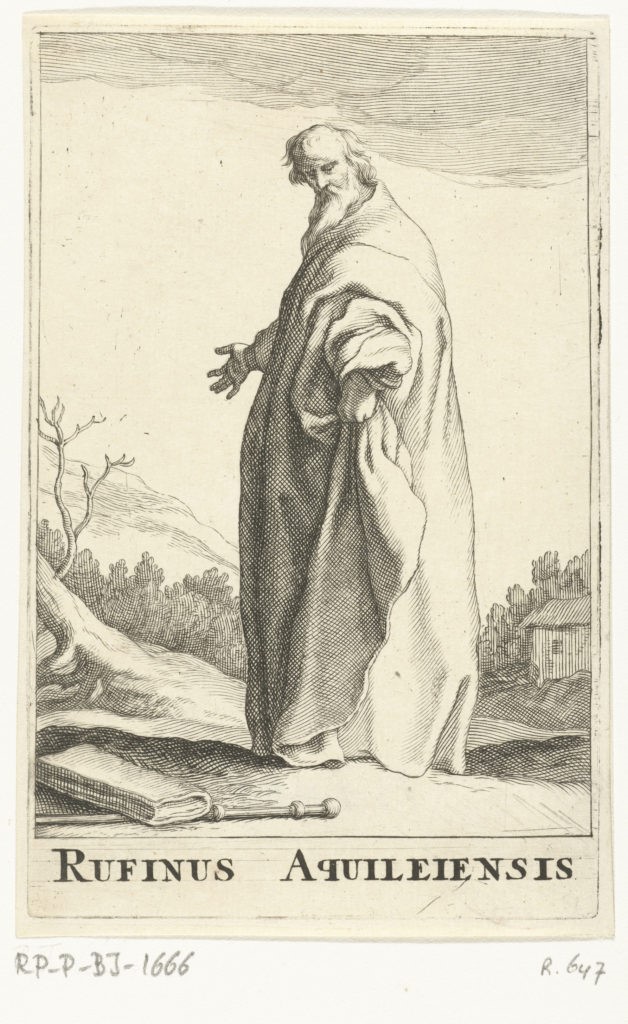– Anastasios
Rufinus of Aquileia, also called Tyrannius Rufinus (346-411) was a theologian and a writer. He was good friend of Saint Jerome. But the friendship took a bad turn and became bitter when they quarreled over the doctrines of Origen. He visited Egypt and Palestine (371-378). Was ordained as a priest by John, bishop of Jerusalem. He will die during a trip back to Palestine, on the Sicily coasts.
He was a prolific writer. He translated from Greek to Latin the Ecclesiastical History by Eusebius of Caesarea, also adding two more books and continuing the history of the Church until 395. Other important works are: Commentarius in symbolum apostolorum, Apologia in Hieronymum, Historia monachorum (this one only attributed with no absolute certainty). He was highly considered among his contemporaries for his theological knowledge, and especially the book on the Apostolic Symbol is considered a masterwork in its own regard.
“The cloud on the reputation of Rufinus due to Jerome’s attacks has unduly depressed the general estimation of his character. In the list of books to be received in the church promulgated by Pope Gelasius at the Roman council, in 494 (Migne’s Patr. Lat. lix. col. 175), we read: “Rufinus, a religious man, wrote many books of use to the church, and many commentaries on the Scripture; but, since the most blessed Jerome infamed him in certain points, we take part with him (Jerome) in this and in all cases in which he has pronounced a condemnation.”
With this official judgment may be contrasted that of Gennadius in his list of ecclesiastical writers (c. 17): “Rufinus, the presbyter of Aquileia, was not the least among the teachers of the church, and in his translations from Greek to Latin shewed an elegant genius. He gave to the Latins a very large part of the library of Greek writers. . . . He also replied in two volumes to him who decried his works, shewing convincingly that he had exercised his powers through the insight given him by God and for the good of the church, and that it was through a spirit of rivalry that his adversary had employed his pen in defaming him” (in https://www.ccel.org/ccel/wace/biodict.html?term=Rufinus%20of%20Aquileia).
Certainly the controversy with Jerome had a very strong importance in the evaluation of the works of Rufinus, controversy from his support to the genius of Origen, which was not always orthodox. We can find traces of this also here: “About 373 Rufinus began to study the writings of Origen (q.v.), one of the Greek doctors of the church. In the early 390s Rufinus and Jerome became involved in a controversy over Origen’s teachings, by this time suspected by orthodox theologians of injecting heretical elements into theology. In 393 both men were charged with Origenist leanings, but Rufinus refused to make formal abjuration of the alleged errors, while Jerome readily did so. The discord between the men continued during the next year, abated by 397, and then flared soon afterward into a bitter quarrel when Rufinus published in Rome a translation of Origen’s De principiis (“On First Principles”) and wrote a preface representing Jerome to be an admirer of Origen. Thereafter, Rufinus was subjected to merciless abuse from Jerome. Rufinus’ orthodoxy was questioned, and he was obliged to write an Apologia to Pope Anastasius, who had summoned him to Rome. For the remainder of his life Rufinus devoted himself to literary pursuits, translating numerous biblical commentaries and homilies by Origen, an Apologia for Origen by the learned teacher and martyr Pamphilus, sermons by Saints Basil and Gregory of Nazianzus, and the history of the early church by the scholar Eusebius; none of these works survive in complete texts. Whenever he suspected that works that he was in the process of translating had been altered by unorthodox theologians, Rufinus did not hesitate to shorten or paraphrase the original text. His own writings include a commentary on the Apostles’ Creed that exemplified contemporary catechetical instruction and provided the earliest continuous Latin text of the creed” (in https://www.britannica.com/biography/Tyrannius-Rufinus).
Rufinus lets us reflect on the work of the theologians then and now. Benedict XVI, during his general audience on October 28, 2009, said: “Dear brothers and sisters, in echoing the invitation of the First Letter of Peter, Scholastic theology stimulates us to be ever ready to account for the hope that is in us (cf 3:15), hearing the questions as our own and thus also being capable of giving an answer. It reminds us that a natural friendship exists between faith and reason, founded in the order of Creation itself.” So it is important to hear the answers coming from theologians, but it is also important to check first how the question is formulated.


 Follow
Follow


